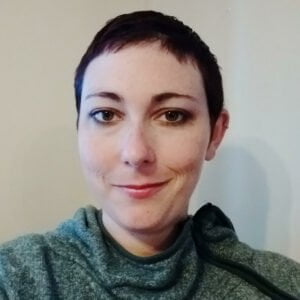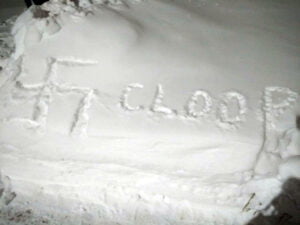
Though my ancestry makes me Jewish and I have family members who are observant, I myself have never been a practicing member of the Jewish community. I write for B’nai Brith Canada as it helps me learn about my family’s roots and because I’m fundamentally opposed to any kind of hatred, so I’m proud to have an outlet where I can call out those who are antisemitic or otherwise prejudiced. I personally have never felt at risk, or that there was even a chance I’d become a target of such intense hatred.
Now I know that I was being naive.
On the evening of Jan. 14, 2017, I left my house and found a swastika (and an accompanying slur that appeared to be sexist) drawn in the snow on my front yard. I live in what some could consider a “rough” end of town, in Sault Ste. Marie, Ont., so at first I didn’t think too much of it, assuming that it was just somebody trying to be funny as they walked by. I took a photo to show my husband, then brushed it away before anyone could think that we had drawn it.
But the more I thought about it – and after seeking advice from a B’nai Brith professional who deals with hate crimes – the more I came to think that it was targeted at me. I’ve said before in previous posts that I live in a small city with a tiny Jewish population. What are the odds that it would just so happen to be in my front yard, when my name and face is on the website of Canada’s foremost Jewish advocacy organization every week?
No, this was clearly meant for me.

As the reality of the situation sunk in, I struggled to figure out how I felt – afraid, angry, sad, frustrated? We’re all aware of the standard “fight or flight” response to being threatened, and I’ve certainly experienced some degree of the “flight” reaction. Should my family and I move to a better neighbourhood? Am I okay to walk to my car at night, or is something going to happen to me? Was this a threat of more to come or just a one-off? What will they do next time if they do come back? I’m at the point where noises or even movement outside my house is putting me on edge, fearing that the culprits will come back to do their worst.
Despite my anxiety, my primary reaction stems the other side of the coin: fight. I want to call out whoever did this and make sure they know that their prank isn’t going to make me withdraw or stop writing on behalf of the Jewish community. I want them to know that whatever they may think of my ancestry or opinions, I’m stronger than their hate.
My main concern in all of this has been to protect my children and shield them from such actions. Fortunately, they’re young enough that they aren’t aware of what’s happened, but one day they’ll be old enough to understand, and how do you explain to a child that people hate you just because of who your grandparents were or because of what you believe in and do behind closed doors? And the more I contemplate this question, the more I think of how many people have to have these conversations with their kids nowadays, and it breaks my heart.
But it also, sadly, fills with me rage. How dare these people come to my home to spread their hatred and bigotry, and bring it to my children? It was only when I went online yesterday that I remembered it was the 88th anniversary of the birth of Dr. Martin Luther King Jr. Scrolling through a list of some of his most memorable quotes, this one really hit home:
Darkness cannot drive out darkness; only light can do that.
Hate cannot drive out hate; only love can do that.
I needed to read that because it reminded me that if I don’t want my children to be raised in the kind of environment that breeds anger and contempt, I need to remember not to let in the darkness and hate. Because if I were to do that, I’d be no better than the miscreants who drew that swastika on my lawn.
Editor’s note: Sara McCleary writes a weekly column for B’nai Brith Canada. She often writes about antisemitism. This week’s column, however, is different as she writes about being the victim of antisemitism at her own home.


